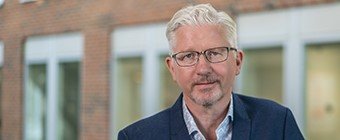New tools to put a price on companies’ climate footprint
More companies want to understand their consumption of natural resources. Not just to display responsibility, but also to assure their survival. COWI is heading the development of a number of tools for companies’ natural capital accounting (NCA) to meet the growing demand.
17.03.2017
It takes a huge amount of water to produce clothes. Actually, the production of just one T-shirt takes around 1,400 litres of water, equivalent to more than 10 full bath tubs.
This not only places an enormous burden on the environment; it also means that the textile industry will struggle to survive if water shortages spread or the water comes at the wrong times and is of poor quality – a scenario that has moved closer in some parts of the world as a result of climate change.
“Companies’ insight into their impact on the environment is not just about being able to prepare nice CSR accounts. Natural capital accounting has moved into the engine room in many companies, as a basis for strategic and economic decisions,” says senior project manager Jesper Karup Pedersen.
"Reducing the environmental footprint of manufacturing has quite simply become a business-critical parameter for many companies and their handling of risks and opportunities," he adds.
New tools suited to fit companies’ reality
Jesper Karup Pedersen is heading a development project aiming to develop a number of tools that companies can use for natural capital accounting (NCA) – in other words putting an exact price on the resource consumption associated with the production of selected goods.
The project is supported by the COWI Foundation and is being run in close collaboration with a number of universities and businesses in Scandinavia.
“It is absolutely crucial for the tools to be developed to address the reality facing these companies,” says Karup Pedersen. “That is the only way we can be sure that they will add real value.”
The firms involved include Egetæpper, Maersk Drilling and Arla Foods, and many of them are already well advanced in collecting and using NCA data in their business planning.
For example, Arla Foods managed to reduce its climate footprint in 2014 by 16% from 2005 levels despite increasing production. This was partly down to efficiency improvements in the production supply chain, which were made on the basis of the NCA data collected.
Better business – better for the environment
But companies, investors and authorities see many shortcomings in the existing methods, explains Karup Pedersen.
“Many of the existing methods are time-consuming and expensive and often investors, authorities and others are unclear about the data that has been used. On top of that, the methods vary. There is no common standard to facilitate the analysis work and allow us to compare different companies’ NCA,” he says. “Another drawback of the existing methods is that .”
The fact remains that NCA has proved its worth, and many businesses have already benefited from it.
Nike is one of the companies that have already addressed the consumption of natural resources in their production. For example, they have developed a new way of dyeing T-shirts without using water. It is not just a matter of making the business less dependent on water resources – it also looks after the environment.
“The increased demand for NCA from companies opens the way for COWI to play an even bigger role with our sustainable solutions,” says Karup Pedersen.
“But we need to enter into close dialogue with universities and companies. We need to learn from them and work with them to develop tools which are transparent, robust and relatively easy to deal with.”
FACTS
- Project name: 360° insight for business decisions – Using natural capital accounting to take informed decisions.
- Support from The COWI Foundation: DKK 2,500,000.
- Universities and educational institutions involved: Copenhagen University (IFRO) and Lund University (IIIEE) plus Copenhagen Business School, the Norwegian University of Life Sciences, Ålborg University and Århus University.
- Think tank involved: Baltic Development Forum.
- The project runs for three years (1 January 2016 – 31 December 2018).
Get in contact

Søren Kragh Pedersen
Head of Group PA & PR
Communication, Denmark
Tel:
+45 2025 7018
skpn@cowi.com